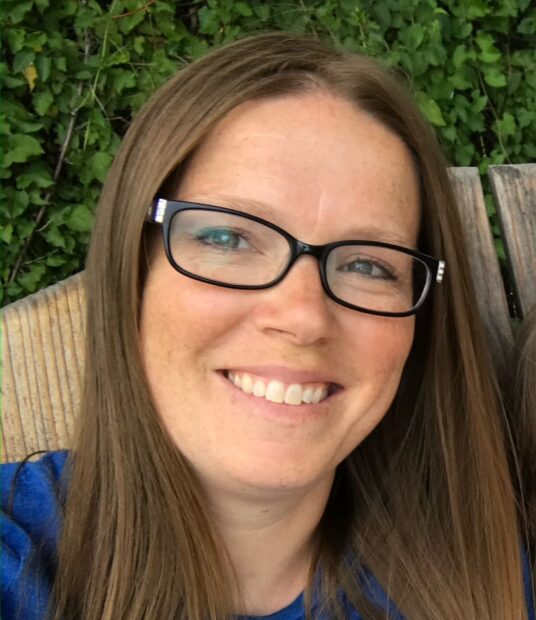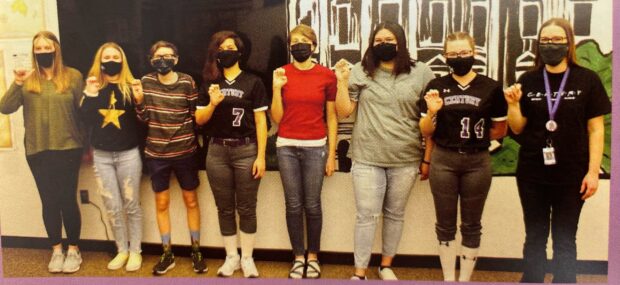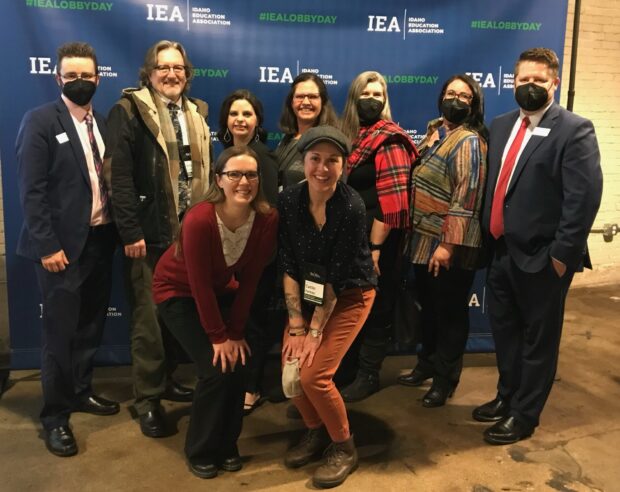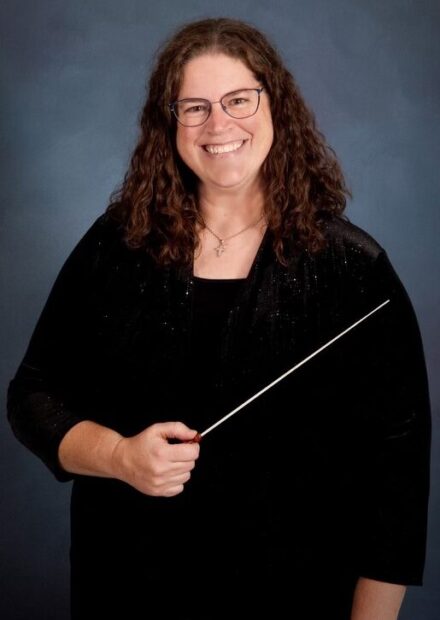Just imagining Lani McDevitt’s Thursdays is exhausting.
The North Junior High teacher arrives at school at 6:45 a.m., spends the day teaching speech, journalism, and creative writing, and gives up her lunch and prep hour to offer a homework lab and oversee a tea club.
After the last bell, she coaches boxing, then teaches night school. She usually finishes her day’s work by about 9:30 p.m.
“It’s bearable because the next day is Friday,” she said.
McDevitt says her workload, which extends far beyond her contract hours, is typical for teachers.
“Schools are a lot like a watch or a clock,” she said. “It all seems very simple … but there are so many tiny moving parts and if even one is damaged, the whole thing doesn’t work anymore. Education is a lot like that.”
And teachers are essential cogs in that clockwork. Driven sometimes by a need to supplement their paychecks, but mostly out of a love for their students, teachers do much more than what’s seen in class.
Ask any teacher in Idaho — that is, if they can squeeze time for a question into their schedule — and they’ll give you a long list of their extra duties, ranging from coaching sports, directing music or drama activities to running clubs or serving on school committees.
Teachers are not technically required to shoulder extra responsibilities, but finding one who doesn’t would be nearly impossible. Here’s a look into the beyond-classroom work that three Gem State teachers undertake.
What’s for lunch? A club meeting. Angela Davis makes her classroom a place to make lifelong friends.
At one time, Angela Davis was “drowning in clubs.”
She ran five, which meant that every day of the week, the high school history teacher gave up her 40-minute lunch to host meetings.

Since then, she’s narrowed her list of clubs to three, but she admits she’s still working to make her to-do list more manageable.
“I haven’t found that balance yet, but I’m hoping to someday,” said Davis, who teaches U.S. history at Pocatello’s Century High.
Angela Davis’ list of extra duties (all unpaid):
-American Sign Language Club advisor
-Human Rights Club advisor
-Future Educators Club advisor
-Junior class advisor
-Pocatello Education Association building representative
-Pocatello Education Association membership committee
-Idaho Education Association Political Action Committee for Education (PACE) member
But if a club she offers gives students a bright spot in their day, she says it’s worth her extra effort.
“Being a teenager is so hard … I just want them to have some fun in the day,” Davis said. “They’re growing up but they’re still goofy kids at heart.”
Davis was always involved in numerous clubs in high school and college, and made lifelong friendships. She wants her students to have the same opportunities she did. And she wants every child to know they’re loved.

“Some of these kids have great homes and people who love them, but some of them don’t,” she said. “And they come to school, and this is the people who love them. So that’s what I try to be for kids.”
But it’s not just her. Every teacher in her school does something extra.
“It takes a village to raise a child, and schools are a village.”

Davis also strives to be a voice for other teachers and for students through her work with the local and state teachers’ union.
“I want to stand up for everybody in the building and make sure that it’s a good place to be,” Davis said.
Teaching strings … at 11 schools. Teacher Kristina Phillips spends her free time planning music festivals and more.
Coeur d’Alene is the only school district in the panhandle that has an orchestra, according to Kristina Phillips, the fifth grade strings teacher for the Coeur d’Alene School District.
Because of that, she takes her role — of bringing orchestral music to North Idaho kids — seriously.
“I feel like I have a responsibility to the larger orchestra world,” she said.

Beyond her duties teaching orchestra at 11 schools in the district (she drives around to four or five different schools everyday), Phillips also plans and coordinates a number of festivals and music programs throughout the panhandle.
Kristina Phillips’ list of extra duties:
-Biannual fifth grade strings concerts
-Strings Day, held on a Saturday in February, when professional musicians teach music students
-March orchestra festival
-March solo festival
-North Idaho solo festival
-Summer music program
-Individual music lessons (paid)
“Music is one of those things where every kid can participate. I’ve had kids who are deaf, I’ve had kids missing fingers or a hand, I’ve had kids who are not athletic, learn how to do this,” she said. “There’s always room for more kids in the orchestra.”
Phillips, a cellist, sees music as a lifelong gift.
“It’s good for your soul to be part of something bigger and to create beautiful music with other people,” she said.
Teachers do what they can to bring opportunities to students in many forms, whether through a club, sport, or arts program — and Phillips said it’s essential for kids to have so many programs to dabble in.
“All these things are great for helping kids discover where they feel like they want to be for the rest of their lives,” Phillips said. “Everybody is brilliant at something different and everybody needs to have the chance to try out different things.”

Phillips takes on extras for a simple reason — it’s good for kids.
“We love our kids that we teach; they’re like an extension of our family,” she said. “And who wouldn’t do a little bit of extra work to help out their kids?”
Tea. Boxing. Homework help. McDevitt offers it all.
Before becoming a teacher, McDevitt was a banker. But she decided to switch to education, where she felt like she could make more of a difference — and she is.
Her lunchtime tea club gives her “calmer, softer” students a safe place to be themselves and enjoy their lunches away from the cafeteria din.
McDevitt’s list of extra duties:
Unpaid:
Boise Education Association Representative
Afternoon Tea Club Advisor
Boxing Club Coach
Morale Committee (supporting other teachers)
PTO Liaison
Paid:
Summer School Teacher
Evening School Teacher
Tech Lead (helping teachers with technology questions and needs)
Viking Learning Lab (a lunchtime homework lab)
And her boxing club gives kids an outlet — a place where they can learn to defend themselves and feel powerful. (It’s non-contact boxing, so McDevitt teaches skills with punching bags and shadow boxing).
“It a great way to teach kids how to feel more confident in themselves and more comfortable as individuals,” said McDevitt, whose dad taught her to box when she was a kid.
Lunchtime homework lab holds kids accountable for what they did — or didn’t — do.
All of it helps McDevitt build rapport with her students. Then, when they’re in her speech class (which can be anxiety-inducing), they’re more likely to feel comfortable in her classroom.
“They already know me, they’ve heard my name, and we’ve connected somewhere along the way,” she said. “It makes my class a lot easier to teach. And the better mood the kids are in, the happier they are, the more they feel like a community.”
Sometimes, the extras teachers take on are highly visible — like the clubs she advises, or coaching sports teams. Other times, that work goes unseen.
The teacher next door to McDevitt, for example, beats her to school each morning. He spends the time lesson planning and grading. Even without a long list of named extracurriculars, teachers are doing more than meets the eye.
McDevitt wouldn’t have it any other way.
“At the end of any given day, I can always say I did at least one good thing, and that makes me really happy,” McDevitt said.
